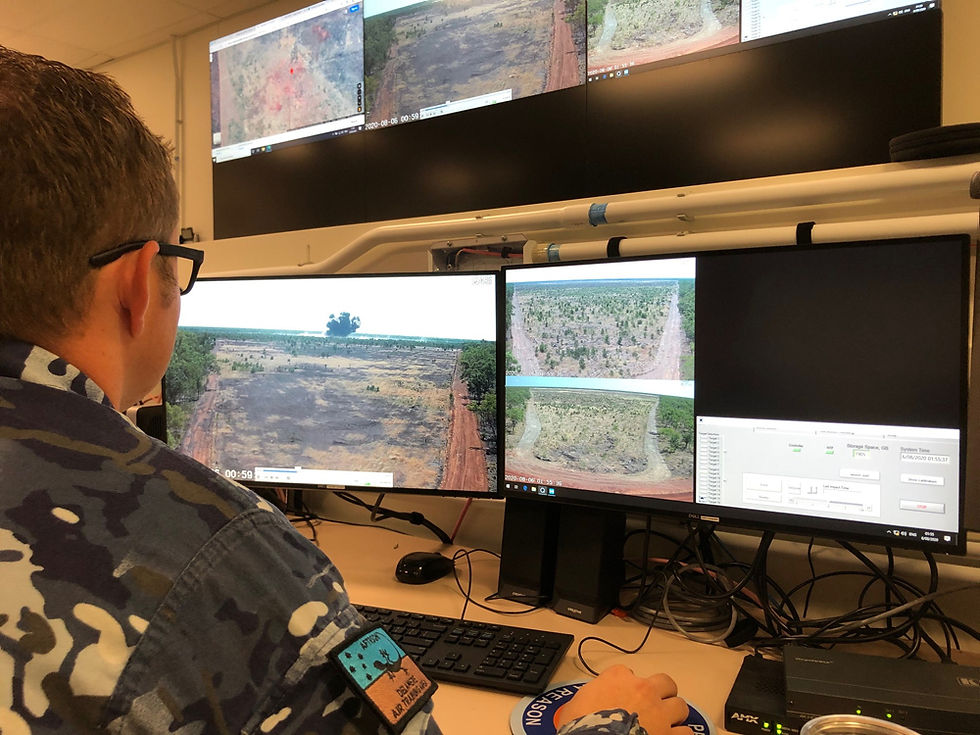Delamere Air Weapons Range – Brian Dick
- Ross Mahoney
- Aug 23, 2020
- 3 min read
One of the strengths of Exercise Pitch Black is its airspace and training ranges – notably the Delamere Air Weapons Range, located approximately 350 kilometres south of Darwin. Whilst the RAAF was forced to cancel Exercise Pitch Black 2020 due to restrictions from CoVID-19, the Range is well-positioned to support exercises into the future.
Introduction
Delamere Air Weapons Range (DEL) from its inception in 1989 through to today, remains a crucial enabler for air power. Located on the South West margin of the Sturt Plateau in the Northern Territory, and a two-hour drive from RAAF Base Tindal, DEL comprises of approximately 2000 square kilometres. The range has three designated airspace training areas and a single 4000-foot unsurfaced runway that can support aircraft up to a C-130 Hercules.
Due to its remote locality and state of the art facilities, DEL facilitates several key training objectives for force generation – not only for the Australian Defence Force (ADF) but for regional partners. The highly sought-after and very capable training area attracts several international partners who require the range not only during exercise periods but also for their specific training activities.

A History
The Wardaman Nation are the traditional custodians of Delamere. Their span of ownership is recognised as far as the south-west of Katherine to Flora River in the North West. European occupation dates back to 1878 where DEL was part of the second oldest pastoral lease, initially known as Glencoe Station, later Delamere Station.
The Commonwealth first acquired Delamere in 1989, and in 1991 gazetted as a Defence Practice Area. In 2014, the Defence Practice Area increased in size through the then termed buffer zone in order to accommodate the planned redevelopment and improvements to range capabilities.
DEL has recently reopened following an extensive redevelopment with $74 million spent on the new Range Control precinct, accommodation and messing, and a further $254 million spent on the Mobile Threat Training and Emitter System (MTTES) project.
MTTES, as part of Project AIR 5349, will provide a live, scalable radio frequency training environment at suitable sites in Australia. MTTES provides high-end support to airborne training, delivering sufficient fidelity, emitter density and training feedback. It will also provide the appropriate management and support, in order to generate the required proficiency levels of RAAF EA-18G aircrew in the execution of Airborne Electronic Attack (AEA) roles during unit, joint and combined training.
Exercise Pitch Black
Exercise Pitch Black has been a biennial staple for Delamere since 1991, the first year the range was gazetted, providing an opportunity for all exercise participants to utilise the ranges’ first-class capabilities. With steadily increasing numbers of ADF and foreign forces participating in the exercise, all staff and visitors can be comfortably accommodated in modern facilities, utilise several different recreation areas, and enjoy a large mess that never fails to turn out quality meals.
DEL offers a variety of training opportunities. The kinetic training conducted at DEL varies on any given day; it could include C-130 Hercules operations with JTAC insertion, to air-delivered weapons drops from Australian or international exercise participants on one of the many kinetic target areas.
Targets on DEL have been specially designed to represent a number of real-life scenarios accurately. Targets include an airfield with dispersed facilities or tank formation.
The world-class new facilities offer the ability to integrate range staff with exercise planners seamlessly. This enables the monitoring of unexploded ordnance, ground and air movements and communications.
Aside from providing an excellent advanced weapon training facility, DEL also provides several other critical effects through updated scoring systems. The range can provide a high-definition video with a live feed to range control, allowing accurate reporting on weapons delivery. Observation towers have also been constructed in order to facilitate safe targeting on the range. Additionally, a permanent electronic warfare capability enables the Air Force to prepare and validate electronic warfare tactics, techniques, and procedures safely and sustainably.
Over the last three decades, DEL has proven itself to be Australia’s premier air training area. Through the provision of modern and realistic facilities, it is clear that the range has direct relevance in developing Australian air power into the future and supporting the generation of a superior fighting force.
Sergeant Brian Dick is the Explosive Ordnance Disposal Technician at Delamere Air Weapons Range for Air Force Test Ranges Squadron, which is part of the Air Warfare Centre. He is responsible for the detection, identification, field evaluation, rendering safe, recovery and final disposal of unexploded ordnance at Delamere Air Weapons Range. Explosive Ordnance Disposal technicians are a specialisation of the Armament Technician trade.





Comments